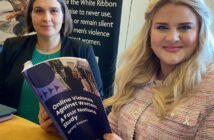Academic study can sometimes mean students cover difficult themes; reading, watching or hearing accounts and taking in information which can be shocking or even a reminder of a highly personal past or present experience.
A team of researchers at The Open University (OU) are investigating how the OU’s students emotionally experience and deal with such materials they encounter in their online study, and looking at ways to affirm and deal with emotional responses to ensure they can continue to engage with all the materials in the best way possible.
Julia Downes (Senior Lecturer in Criminology), Ruth Wall (Associate Lecturer and Consultant in Social Sciences), and Anne Alvaer (Associate Lecturer and Consultant in Social Sciences) gathered early findings ahead of their Office For Students-funded research project, designed to inform the wider Higher Education sector when providing teaching and learning for part-time, commuter and distance learners.
Duty of care and a need to equip our students
Educators and students are typically not in the same room: distance students study their learning materials flexibly at home, work and everywhere in-between. Topics they study can frequently touch upon violence, injustice, and oppression that many in our university community directly experience and are affected by during study. In the field of the researchers, the Social Sciences, this is even more common due to topics such as deaths in custody, sex work, gender-based violence, immigration, and homelessness.
Dr Julia Downes says:
“Educators have to think carefully about how to teach these topics whilst also safeguarding and supporting students, even considering whether it is safer to avoid topics that are just too difficult and sensitive. These challenges become deeper in distance learning.
“The onus is on universities to deliver a duty of care and appropriately equip students to engage with the learning materials that educators create for them.”
The benefit of “emotional resilience skills”
“We learned that students arrived with skills, capacities, and strengths to navigate the emotional aspects of their lives that they could then use to reduce risk and increase resilience in their study of sensitive topics. Exactly what students felt and did was unique to them and could range from stepping back and taking a break, getting support from a partner or friend, escaping into a Disney movie, box set or video game, planning to study and taking a different study approach.”
The team say they refer to such activity among students as “emotional resilience skills” and understand these as a universally relevant academic skillset for all educators and students.
Dr Downes says:
“Not surprisingly, we found that many students expected to study sensitive and emotive topics in criminology. In fact, the ability to engage with difficult topics was considered an important employability skill for students who currently worked, or aspired to work, with people in contact with the criminal justice system.”
She says that some are even studying as a deliberate means to understand what may have happened to them in the past.
“Educators therefore need to be aware that someone with lived experience of a case study or topic they are teaching will be in their classroom, be it a virtual, print, or face-to-face relationship.
“Whilst students commonly reported feeling sad and upset this was often accompanied by acknowledgements of how engaging with these case studies also benefited them.
“Benefits included gaining a deeper understanding, an ability to look at a situation differently and a reminder of their purpose and motivation for study. Engaging with sensitive content could also spark a passion and curiosity to find out more and make sense of the world around them.”
This echoes previous studies that found positive and negative emotions are inevitable, productive, and necessary for learning (O’Byrne 2014; Lowe 2015; Connelly & Joseph-Salisbury 2019).
“Guidance acted as a valuable space to normalise emotional responses”
Dr Downes said the team found that in practice, the content notes and guidance put in place meant the OU students were better able to engage with, rather than avoid or ignore, emotive and sensitive content.
“Content notes were a signal of care that worked to enhance engagement by activating emotional resilience skills including preparation and planning, self-care, and self-awareness. The guidance acted as a valuable space to normalise emotional responses, which could reduce feelings of isolation.
“Feedback from the sample student groups showed that they wanted more spaces, activities, and resources that acknowledged their emotional responses, affirmed, and strengthened their emotional resilience skills across the student learning journey.”
The research team say that how universities deliver trauma-informed distance learning is an exciting new area for higher education, particularly as many universities have shifted to hybrid and online forms of delivery during the pandemic.
It will be the focus of the next phase of their work: to develop multi-media outputs, included in an emotional resilience skills toolkit for staff and students as part of the Office for Students funded Positive Digital Practices project (2020-2022).
Dr Downes said: “We learned a lot during our project, and we are looking forward to writing up our findings in more detail to share in academic journals, conferences, and as part of the British Society of Criminology Teaching and Learning Network.
“We want to express our gratitude to the students who generously shared their experiences with us, FASSTEST for supporting our project, as well as staff and students with whom we continue to learn alongside.”
Read more from Dr Downes, the project and about FASSTEST (FASS Teaching Excellence and Scholarship of Teaching, which is the Centre for Scholarship and Innovation in the Open University’s Faculty of Arts and Social Sciences.



